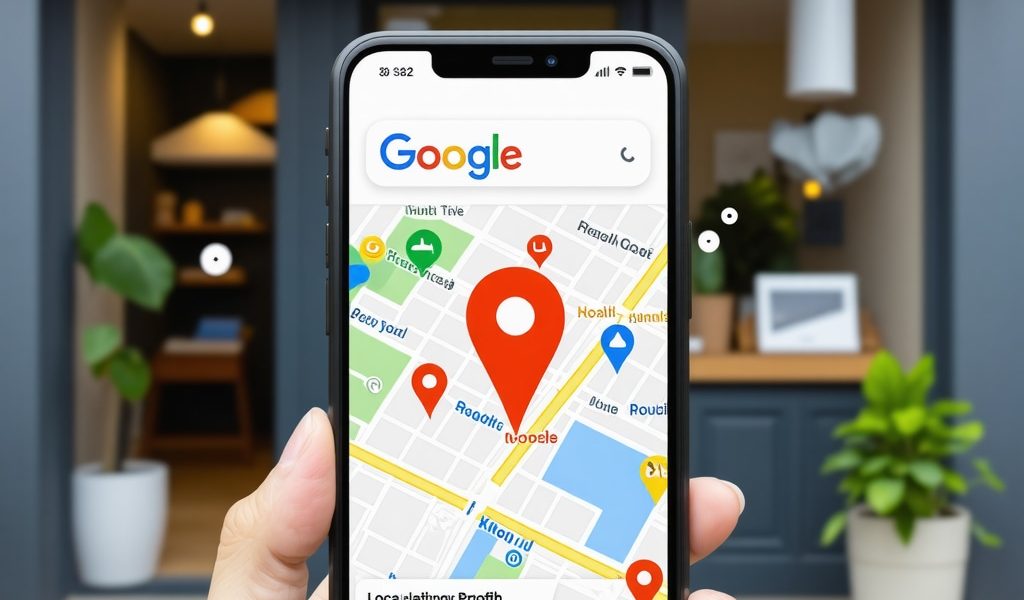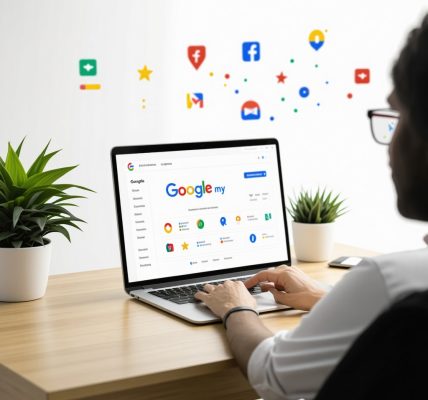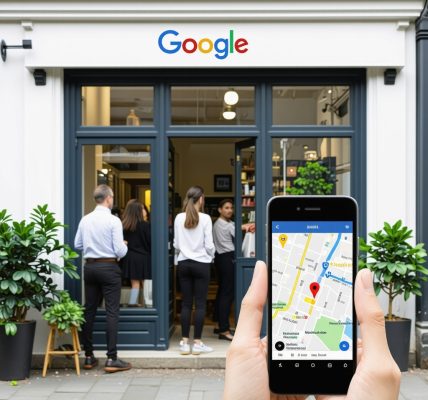Unlocking the Power of Keywords in Google Business Profiles
In the fiercely competitive landscape of local search, leveraging keywords effectively within your Google Business Profile (GBP) can be the game-changer that propels your business to the forefront of local customers’ attention. Unlike traditional SEO, local keyword optimization in GBP requires a nuanced, experience-driven approach that balances relevance, user intent, and Google’s evolving algorithmic preferences. This article dives deep into expert strategies for harnessing keywords in Google Business Profiles to ignite sustained local growth in 2025 and beyond.
Embedding Semantic Richness: Beyond Basic Keyword Insertion
Many businesses fall into the trap of merely stuffing their GBP description with primary keywords, but true expertise lies in integrating Latent Semantic Indexing (LSI) keywords and related phrases that enrich contextual relevance. For example, a local bakery shouldn’t just use “bakery near me” but also terms like “artisan bread,” “fresh pastries,” and “custom cakes delivery.” This layered semantic approach enhances your profile’s topical authority and helps Google better understand your business nuances, ultimately boosting your visibility for varied local search queries.
How Can Strategic Keyword Placement Elevate Your Local Search Rankings?
Strategic placement of keywords in GBP elements—such as the business name, description, categories, and services—plays a pivotal role in local SEO success. However, Google’s guidelines advise caution around keyword insertion in the business name to avoid penalties. Instead, focus on crafting a compelling description that naturally includes primary and secondary keywords that resonate with typical customer searches. Including geo-specific keywords, such as neighborhood names or landmarks, can further target hyperlocal audiences, increasing foot traffic and leads.
Harnessing Data-Driven Keyword Research for Targeted Local Impact
Expert keyword optimization starts with meticulous research. Utilizing tools like Google Keyword Planner combined with insights from Google Business Profile analytics can uncover high-intent local search terms your competitors might overlook. Tailoring your keyword strategy based on seasonal trends, customer behavior, and local demand ensures your profile remains relevant and engaging. For instance, a landscaping service might highlight “spring garden cleanup” in early months and pivot to “winter snow removal” as seasons change, leveraging keywords that reflect timely local needs.
Optimizing GBP Content with Engaging, Keyword-Rich Descriptions
Crafting an engaging GBP description that artfully weaves in keywords is an art form that demands both creativity and SEO savvy. Prioritize clarity and user value by describing your unique selling points, services, and customer benefits while embedding keywords organically. Avoid keyword stuffing or mechanical repetition, which can diminish user experience and reduce ranking potential. Instead, aim for a conversational tone that builds trust and encourages potential customers to engage with your business.
Experience-Backed Insights: Real-World Success Stories
Consider a local café that revamped its Google Business Profile by integrating targeted keywords reflecting popular menu items and local events. Within months, they observed a 30% increase in profile views and a significant uptick in customer inquiries. This practical example underscores how thoughtful keyword integration, coupled with consistent profile updates, can translate into measurable local growth.
For businesses eager to refine their GBP keyword strategy further, exploring comprehensive guides such as Google Business Keyword Strategy: Optimize Listings for 2025 provides invaluable, authoritative insights into advanced optimization tactics.
Explore more expert advice on boosting your profile with targeted keywords in Boost Your Google Business Listing SEO with Targeted Keywords.
If you found these insights useful, share your experiences or questions in the comments below to foster a community of local SEO excellence!
Integrating Keywords with Google Business Posts for Consistent Engagement
One tactic I’ve found incredibly effective in my journey optimizing Google Business Profiles is the strategic use of Google Business Posts. These posts offer a dynamic avenue to weave in keywords naturally while keeping your audience engaged with timely updates, offers, and events. For instance, when I helped a local gym promote their “summer fitness challenge,” we included targeted keywords like “fitness bootcamp near me” and “local gym memberships” within the posts. This not only drove immediate traffic but also enhanced the profile’s keyword relevancy signals to Google.
Regular posting ensures your profile remains fresh and signals to Google that your business is active, which can positively influence your local rankings. For a deep dive into mastering this tactic, check out the Ultimate Guide to Weekly GMB Posting for Consistent Traffic.
How Can You Balance Keyword Optimization and Authentic Customer Interaction?
This question often comes up in my discussions with small business owners. The key is to remember that keywords should enhance your communication, not dominate it. I recall working with a boutique florist who initially overstuffed their description with phrases like “best flower delivery” and “wedding bouquets.” While it was keyword-rich, it felt forced and less personal. After reworking the description to focus on their unique floral arrangements, seasonal selections, and customer stories—while subtly embedding keywords—the engagement improved dramatically.
Google’s own guidelines emphasize the importance of authenticity and user experience, which aligns perfectly with this balanced approach. According to Search Engine Journal, over-optimization can lead to penalties, so maintaining natural language is vital.
Leveraging Reviews as a Keyword-Rich Asset
Reviews are more than just social proof; they’re a treasure trove of naturally occurring keywords that reflect how customers describe your business. Encouraging clients to share detailed feedback with authentic descriptions of your services can organically boost your keyword footprint. For example, a local handyman I consulted for began requesting reviews mentioning specific services like “emergency plumbing repairs” and “affordable electrical fixes.” Over time, these keywords embedded in customer reviews contributed to improved local search visibility.
To maximize this, ensure you respond to reviews thoughtfully, incorporating relevant keywords where appropriate, which further signals to Google your active engagement and relevance.
My Take on Citation Consistency and Its Keyword Impact
Another aspect I’ve learned the hard way is that citation consistency across directories—name, address, phone number (NAP)—plays an indirect but crucial role in keyword effectiveness. Inconsistent citations can confuse search engines, diluting your local SEO efforts. I once managed a campaign where correcting NAP inconsistencies across multiple platforms helped stabilize rankings and allowed our keyword strategies to perform more predictably.
For those looking to dive deeper, exploring best practices for GMB citation management is a great next step.
Continuously Tracking and Tweaking Your Keyword Strategy
Optimization is never a one-and-done task. From my experience, regularly tracking your Google Business Profile performance via analytics tools and adjusting keywords based on what’s working and what’s not is essential. I recommend using the insights from Google’s dashboard to spot rising keyword trends or declining terms and pivot accordingly.
This adaptive mindset helped a local restaurant I worked with to spot emerging search terms like “gluten-free options near me” and adjust their profile to include these keywords, capturing new customer segments.
If you want to learn how to track your GMB performance and adjust your SEO strategy effectively, there are detailed resources to guide you through.
Have you tried any of these keyword strategies on your Google Business Profile? What results did you see? Share your stories or questions below—I’d love to hear how you’re navigating the world of local SEO!
Harnessing AI-Powered Semantic Analysis to Refine Keyword Targeting
As artificial intelligence increasingly shapes search engine algorithms, understanding and leveraging AI-driven semantic search capabilities can elevate your Google Business Profile keyword strategy beyond traditional tactics. AI models now interpret user intent with greater nuance, emphasizing context and natural language over isolated keyword matches. For instance, Google’s BERT and MUM updates prioritize understanding conversational queries, making it crucial to integrate keywords in ways that reflect how people naturally ask questions or describe their needs locally.
Deploying AI-powered tools such as natural language processing (NLP) analyzers can help identify semantically related keyword clusters and emerging local search trends. These insights enable businesses to craft GBP descriptions and posts that resonate with conversational search patterns, capturing voice and text queries alike. By aligning keyword integration with AI’s semantic understanding, your profile can appear in more diverse, intent-driven searches, thereby expanding your local reach.
Optimizing for Voice Search: Keywords in a Conversational Era
Voice search now accounts for an estimated 27% of all online queries, according to a 2024 study by Pew Research Center. This shift demands a refined keyword approach that prioritizes natural, question-based phrases and long-tail keywords mirroring everyday speech. For example, instead of a terse keyword like “coffee shop,” consider integrating phrases like “where can I find a cozy coffee shop near me?” or “best espresso for takeout in [neighborhood].”
Incorporate these conversational keywords into Google Business Posts, Q&A sections, and service descriptions to capture voice searchers effectively. Additionally, structuring your FAQ content to answer common local queries in a natural tone can further enhance voice search visibility.
How Can Businesses Identify and Integrate Conversational Keywords for Voice Search Optimization?
Identifying conversational keywords begins with analyzing actual queries from voice search analytics and local customer interactions. Tools like Google’s Search Console and third-party platforms such as AnswerThePublic can surface frequently asked questions and natural language phrases relevant to your industry and locale. Once identified, integrate these phrases organically into your GBP by answering them within posts, Q&A, or detailed service descriptions.
Moreover, consider leveraging schema markup to provide structured data that helps search engines better understand and present your business information in voice search results. This technical enhancement, combined with natural language keyword integration, creates a powerful synergy for capturing voice-driven traffic.
Advanced Schema Markup: Amplifying Keyword Signals for Local SEO
While keywords remain foundational, supplementing your Google Business Profile with advanced schema markup can significantly amplify your SEO efforts. Schema vocabulary, such as LocalBusiness, Service, and Offer, enables search engines to parse and contextualize your profile content with precision, enhancing your chances for rich snippets and enhanced local listings.
Incorporate keyword-rich attributes within your structured data, including service descriptions and areaServed properties, to reinforce your semantic relevance. For example, a legal consultancy could use schema to specify “estate planning services in downtown Chicago,” aligning structured data with targeted keywords. This dual-layered approach—organic content plus structured data—signals to search engines a comprehensive understanding of your offerings and location.
For detailed schema implementation guidelines, refer to Google’s official documentation on Local Business structured data.
Continuous Learning: Leveraging GBP Insights for Proactive Keyword Refinement
Google Business Profile’s insights dashboard presents an underutilized goldmine for keyword strategy evolution. Beyond basic metrics, analyzing search queries that lead customers to your profile reveals emerging local trends or niche service demands. By systematically monitoring these insights, businesses can proactively refine their keyword sets to capture untapped opportunities or seasonal shifts.
For example, if a boutique fitness studio notices a spike in “virtual yoga classes near me” searches, integrating this keyword phrase prominently can attract a new segment of remote clients. This iterative, data-driven approach ensures your keyword strategy remains agile and aligned with real-world user behavior.
Have you explored the depth of your GBP insights lately? Experiment with integrating new keywords based on actual search queries and observe how your local engagement evolves—sharing your findings can inspire others in our community.
Decoding Latent Semantic Indexing (LSI) for Enhanced Local Keyword Relevance
Embracing Latent Semantic Indexing (LSI) keywords within your Google Business Profile transcends basic keyword stuffing by embedding contextually related phrases that broaden your profile’s topical footprint. LSI keywords, derived through AI-driven semantic analysis, enable search engines to comprehend the thematic depth of your offerings, thus improving your profile’s relevance across a spectrum of local queries. For example, a local pet grooming service might integrate terms like “canine care,” “pet styling,” and “mobile grooming services” alongside core keywords to capture a more diverse audience.
Implementing Behavioral Signals to Complement Keyword Optimization
Beyond textual optimization, behavioral metrics such as click-through rates, customer actions, and engagement duration signal to Google the authentic relevance of your profile. By optimizing keywords that align with user intent and pairing them with compelling calls-to-action and interactive content in posts or Q&A, businesses can enhance these behavioral signals, reinforcing their local search prominence. This holistic approach intertwines keyword strategy with user experience, a synergy increasingly favored by Google’s evolving algorithms.
What Are the Best Practices for Leveraging AI-Based Tools to Discover Emerging Local Keywords?
Cutting-edge AI-powered tools like Clearscope, SurferSEO, and BrightEdge integrate natural language processing and machine learning to analyze vast datasets and surface emerging local keyword opportunities that traditional tools might miss. These platforms evaluate search intent nuances, competitor performance, and semantic relevance, enabling businesses to craft GBP content that aligns precisely with evolving local search behaviors. For instance, incorporating data-driven insights can reveal trending neighborhood-specific terms or emerging service demands, allowing timely profile adjustments that outpace competitors.
For authoritative guidance on employing these AI tools for local SEO, BrightEdge’s AI for SEO webinar series offers expert insights grounded in industry best practices.
Strategic Utilization of Google Business Profile Questions & Answers to Reinforce Keyword Themes
The Google Business Profile Q&A section presents a unique opportunity to embed conversational keywords organically. By proactively posting frequently asked questions that mirror actual customer inquiries and embedding targeted keywords within answers, businesses can capture long-tail search queries and voice search traffic effectively. This tactic not only improves keyword diversity but also enhances user engagement by providing immediate value and clarity to potential customers.
Furthermore, encouraging customers to ask genuine questions fosters authentic content creation, which Google values highly for relevance and freshness.
Integrating Multimedia Content with Keyword-Rich Metadata for SEO Synergy
Incorporating images and videos into your Google Business Profile, accompanied by keyword-optimized filenames, alt texts, and descriptions, amplifies your keyword footprint across multiple dimensions. Multimedia content enhances user engagement, dwell time, and provides additional signals to search engines about your business’s offerings. For instance, a restaurant might upload photos of seasonal dishes with descriptive alt texts like “vegan gluten-free pasta in downtown Seattle,” thereby reinforcing geo-specific keywords alongside service descriptors.
This multi-modal approach broadens your profile’s visibility across search verticals and enriches customer experience simultaneously.
Embracing Continuous Optimization Through A/B Testing of Keyword Variations
Advanced practitioners understand that keyword optimization is iterative. Implementing A/B testing for different keyword integrations within your GBP descriptions, posts, and Q&A can reveal which terms resonate most with your audience and drive higher engagement or conversions. By systematically measuring performance metrics such as clicks, calls, or booking requests tied to specific keyword variants, businesses can refine their strategy with empirical evidence rather than assumptions, ensuring sustained local SEO efficacy.
Such data-driven experimentation aligns with modern digital marketing principles and enables agile responses to changing market dynamics.
Are you ready to elevate your Google Business Profile with these sophisticated keyword strategies? Engage with our expert community or consult detailed resources to transform your local SEO approach today!
Frequently Asked Questions (FAQ)
What are the most effective places to include keywords in a Google Business Profile?
Keywords should be strategically integrated into the business description, services, categories, Google Business Posts, Q&A sections, and multimedia metadata. While incorporating keywords into the business name is discouraged due to potential penalties, embedding geo-specific and semantically related terms naturally within descriptive and interactive elements enhances visibility and relevance for local searches.
How can Latent Semantic Indexing (LSI) keywords improve my local SEO efforts?
LSI keywords enrich your profile by adding contextually related terms that broaden the thematic relevance of your content. This helps Google better understand the scope of your services and offerings beyond primary keywords, enabling your profile to rank for a wider variety of related local queries and support conversational search patterns.
Why is balancing keyword optimization and authentic customer interaction important?
Over-optimization can lead to penalties and degrade user experience. Authentic, customer-focused language that naturally integrates keywords builds trust and encourages engagement. Google prioritizes user experience and authenticity, so blending keyword strategy with genuine communication ensures sustainable local SEO success.
How can I leverage Google Business Profile reviews for keyword optimization?
Encouraging customers to include specific service-related phrases in their reviews introduces natural, user-generated keywords that increase your profile’s semantic footprint. Responding thoughtfully and incorporating relevant keywords in replies further signals active engagement and relevance to Google.
What role does AI-powered semantic analysis play in keyword strategy?
AI-driven tools analyze search intent and semantic relationships, revealing emerging local keywords and conversational phrases. Leveraging these insights allows businesses to optimize their GBP content to align with how users naturally search, especially for voice queries, enhancing local reach and relevance.
How can I optimize my Google Business Profile for voice search?
Voice search favors natural, conversational, and question-based keywords. Integrate long-tail phrases that mimic spoken queries into your profile’s posts, Q&A, and descriptions. Utilizing tools like AnswerThePublic to identify common questions and implementing structured data can further enhance voice search visibility.
What is the importance of citation consistency in keyword effectiveness?
Consistent Name, Address, Phone Number (NAP) information across directories prevents confusion for search engines and supports the credibility of your keyword signals. Inconsistent citations can undermine local SEO efforts, making it harder for your optimized keywords to achieve their full impact.
How does schema markup amplify keyword signals for local SEO?
Schema markup provides structured data that helps search engines understand your business context and services with precision. Embedding keyword-rich attributes within schema (like service descriptions and area served) enhances your profile’s semantic relevance and increases chances for rich snippets, thereby improving visibility.
Why is continuous tracking and A/B testing important for keyword optimization?
Local search trends and user behavior evolve over time. Regularly analyzing your GBP insights and testing different keyword variations enables evidence-based refinement of your strategy, ensuring sustained engagement and conversion improvements.
How can Google Business Profile Questions & Answers be used for keyword reinforcement?
The Q&A section allows embedding conversational keywords through authentic and proactively posted questions and answers. This approach captures long-tail and voice search queries naturally while enhancing user engagement and content freshness.
Trusted External Sources
- Google Developers – Local Business Structured Data Documentation: Provides authoritative guidance on implementing schema markup to enhance local SEO through structured data, crucial for amplifying keyword signals effectively.
- BrightEdge – AI for SEO Webinar Series: Offers expert insights into applying AI-powered tools for discovering emerging local keywords and semantic optimization, supporting advanced keyword strategies.
- Search Engine Journal – Google My Business Optimization Guidelines: A trusted industry publication detailing best practices, penalties to avoid, and strategies for balancing keyword use with authentic user experience.
- Pew Research Center – Voice Assistant Usage and Local Search Study (2024): Supplies up-to-date statistics and analysis on voice search trends, informing keyword approaches tailored to conversational queries.
- AnswerThePublic: A specialized tool that surfaces real user questions and natural language phrases, invaluable for sourcing conversational keywords for GBP content and voice search optimization.
Conclusion
Mastering keyword optimization within your Google Business Profile is a nuanced, ongoing process that blends semantic richness, authentic communication, and data-driven insights. By strategically embedding primary, secondary, and LSI keywords into various GBP elements—while aligning with evolving AI-powered search algorithms and voice search trends—you position your business to capture diverse and intent-driven local traffic effectively. Tools such as structured schema markup, AI analytics, and continuous A/B testing refine your approach, ensuring your profile remains relevant and competitive in 2025’s local SEO landscape.
Embrace a balanced strategy that prioritizes user experience alongside technical optimization, leverage customer reviews and Q&A for organic keyword growth, and consistently monitor performance metrics to adapt dynamically. Your Google Business Profile, when expertly optimized, becomes a powerful beacon attracting targeted local customers and driving sustained growth.
Ready to elevate your local SEO game? Share your experiences, ask questions, and explore our related expert content to deepen your understanding and transform your Google Business Profile into your most valuable digital asset.




